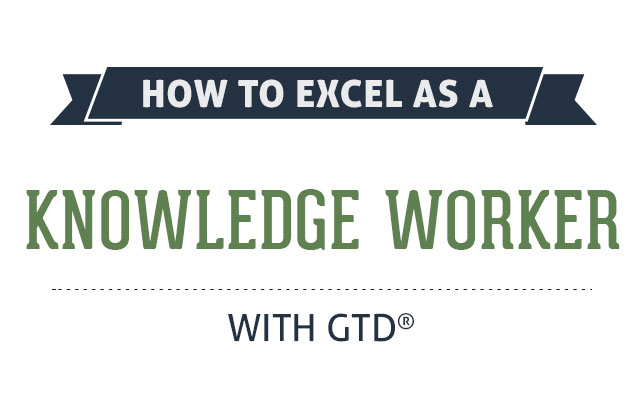We’re different.
Quite a bit so.
Where just decades ago “work” was considered to be rote – cut and dried, today constant creative thinking and brainstorming, are the essence of our professional lives.
Look in the Mirror & Say “Hello” to a Knowledge Worker
Do you “think for a living?”
When you step into your office – do you have a fair idea of how your day will go?
Or do ad-hoc tasks come at you in your inbox, through peer calls and even as ideas inspired by a blog post you happen to read?
If information + uncertainty = Your typical work routine, you are a knowledge worker.
You are expected to make sense of chaos.
You are expected to process overwhelming volumes of information and define your projects using your “professional judgment”.
And most importantly, you are required to be agile, open to last minute changes and completely fluid in terms of your schedule.
It’s challenging to say the least.
The Typical Woes of a Knowledge Worker
Picture this. You’re sitting at your desk and you have your day pretty much planned out.
But just when you’re about to get started with your to-do list, an email hits the inbox.
It’s urgent and it’s from sales.
News has come in that due to the recent spate of tax policy changes, your procurement department won’t be able to replenish inventory.
The orders that your company was supposed to deliver aren’t going to ship on time.
Now as the chief marketing personnel – what does this tell you?
The email content is not asking you to “do” anything. It’s information you should know as one of the stakeholders.
But if your projects aren’t explicitly defined, your goals aren’t clear and you don’t have wriggle room in your calendar – you might panic feelling like all the gods are conspiring against you.
Or your mind feels toast, so you just ignore it… till it blow up!
This is what knowledge workers typically suffer from.
They have so much coming at them and so little clarity that there isn’t enough mental bandwidth to aim for a strategic, intuitive approach.
They might attend to the latest and the loudest instead of focusing on priorities – because their purpose in life and in their company is a vague.
They might take on more than they can ever hope to finish because there is no complete list of everything they’re responsible for!
They might have no idea of where they should look for their next tasks because every communication channel adds stuff to the plate.
Getting Things Done® is Designed to Help You Ace Your Routine
Getting Things Done benefits everyone. But those who think for a living are right at the top of the list because the framework is created to help you:
- Capture the inputs on your radar so that they stop wasting brain cycles and are entrusted to an external system. Blessed headspace for creativity.
- Define your work. The questions “Is it actionable?” “What’s the successful outcome?” and “What’s the next action?” work together to get clear what your work actually is.
- Organize your tasks by context so that you are reminded to do the right things at the right time.
- Get into the habit of regularly reviewing your lists to confidently say “no” to possibilities that distract and be prepared for surprises – like sudden emails from sales departments!
Time management is a misnomer
Time isn’t something to be managed – there can never be more than 24 hours a day.
It’s focus or attention management that’s the key to knowledge worker success.
And Getting Things Done is the best methodology out there for it!
Motivated? Check out our Public Workshop schedule and see where the next event is slated to happen. It might just be your city.
I believe our work should be an expression of our most creative selves. I work with business owners and their teams to achieve stress-free productivity.

